
Critical Studies on Security
Scope & Guideline
Engaging with the Frontiers of Political Science and Security
Introduction
Aims and Scopes
- Critical Examination of Security Practices:
The journal emphasizes a critical approach to understanding security practices, including military, political, and social dimensions, interrogating how these practices shape identities, communities, and power dynamics. - Interdisciplinary Perspectives:
It incorporates insights from diverse fields such as sociology, political science, cultural studies, and critical theory, fostering a rich dialogue about security that transcends traditional boundaries. - Focus on Marginalized Voices:
The journal is committed to amplifying voices and perspectives that have been historically marginalized in security studies, including those related to gender, race, and postcoloniality. - Engagement with Global Issues:
The scope includes an engagement with global security issues, addressing themes such as migration, climate change, and geopolitical conflicts, thereby situating local narratives within broader global contexts. - Innovative Methodological Approaches:
It encourages innovative methodologies, including qualitative, artistic, and performative research, to explore the complexities of security and its representations.
Trending and Emerging
- Climate Security and Ecological Concerns:
Recent publications have increasingly addressed the intersections of climate change and security, reflecting a growing recognition of ecological security as a critical area of study in light of global environmental crises. - Postcolonial and Decolonial Perspectives:
There is a notable trend towards incorporating postcolonial and decolonial frameworks in security studies, emphasizing the need to understand security through the lens of historical and ongoing colonial legacies. - Securitization of Health and Pandemics:
The COVID-19 pandemic has led to a surge in discussions around health securitization, exploring how public health crises are framed within security discourses and their implications for social justice and equity. - Narratives of Resistance and Activism:
Emerging themes focus on community resistance and activism in the face of security challenges, highlighting grassroots movements and local agency as critical components of security studies. - Intersectionality in Security Discourse:
There is an increasing emphasis on intersectionality, examining how various identities (race, gender, sexuality) influence experiences of insecurity and security practices, thus enriching the discourse with diverse perspectives.
Declining or Waning
- Traditional State-Centric Security:
There is a noticeable decline in articles focused solely on traditional state-centric security paradigms, as the journal increasingly emphasizes non-state actors, local practices, and the broader socio-political implications of security. - Militarization as a Singular Focus:
While militarization remains a topic of interest, the journal is moving away from examining militarization in isolation, instead integrating it into broader discussions of social justice, identity, and community resilience. - Homogenized Narratives of Security:
The journal's publications are shifting away from homogenized narratives that portray security issues in a binary manner (e.g., victim vs. aggressor), favoring more nuanced and complex understandings that consider intersectionality and multiple perspectives. - Local versus Global Dichotomy:
There has been a waning emphasis on the local versus global dichotomy in security discussions, as the journal increasingly seeks to bridge these realms, recognizing their interconnectedness. - Overemphasis on Theoretical Frameworks:
There is a decline in the focus on overly theoretical discussions that lack empirical grounding, with a growing preference for articles that offer practical insights and real-world implications.
Similar Journals
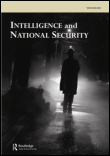
INTELLIGENCE AND NATIONAL SECURITY
Bridging Theory and Practice in National SecurityINTELLIGENCE AND NATIONAL SECURITY is a leading academic journal published by Routledge Journals, Taylor & Francis Ltd, providing critical insights into the interplay between intelligence practices and national security concerns. With its origins dating back to 1986, this journal has established itself as a vital resource for researchers and practitioners alike, offering a platform for the dissemination of rigorous research across History (Q1) and Political Science and International Relations (Q2). While the journal does not operate under an Open Access model, its articles are accessible through institutional subscriptions, ensuring that important findings reach a wide audience. The journal ranks significantly on Scopus, holding the 93rd percentile in History and the 61st percentile in Political Science, underscoring its relevance and impact in scholarly discourse. Whether you are a researcher looking to publish your findings or a student seeking in-depth analysis in the field, INTELLIGENCE AND NATIONAL SECURITY remains an indispensable resource for advancing understanding in the complexities of global security issues.

Politicke Vedy
Fostering Critical Analysis for a Changing WorldPoliticke Vedy is a distinguished academic journal published by BELIANUM-MATEJ BEL UNIV PRESS, dedicated to the field of political science and international relations. With its ISSN 1335-2741 and E-ISSN 1338-5623, the journal serves as a vital platform for scholars, researchers, and practitioners to disseminate original research and critical analyses pertaining to contemporary political issues and theories. Although the journal currently operates under a non-open access model, it is committed to enhancing the academic dialogue and advancing understanding within the political realm. Based in Banska Bystrica, Slovakia, the journal aims to publish high-quality articles that reflect diverse perspectives and innovative approaches in political science. Its emphasis on rigorous peer review and scholarly integrity makes it an important resource for anyone seeking to engage deeply with political studies and international relations.
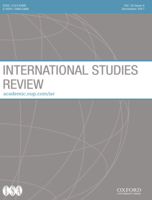
International Studies Review
Advancing Understanding in International RelationsInternational Studies Review is a premier academic journal published by Oxford University Press, dedicated to exploring the intricacies of global politics, international relations, and geographical dynamics. With an impressive impact factor and ranked in the top quartile (Q1) across both Geography, Planning and Development and Political Science and International Relations, it continues to be a vital resource for scholars and practitioners alike. The journal has been at the forefront of critical discussions and analyses in the field since its inception in 1999 and will be publishing up to 2024. With a Scopus rank of #32 in Political Science, placing it in the 95th percentile, it is recognized for its rigorous research and impactful contributions. The International Studies Review primarily caters to researchers, professionals, and students who seek to deepen their understanding of contemporary international issues, making it an essential platform for interdisciplinary scholarship in an ever-evolving global landscape.
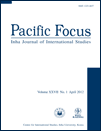
Pacific Focus
Advancing Knowledge in Political Science and International RelationsPacific Focus is a renowned academic journal published by WILEY, focusing on the dynamic fields of Political Science and International Relations. Established in 1986, it has developed a reputation for disseminating innovative research and critical analysis pertinent to the geopolitical landscape of the Pacific region and beyond. With an impressive rank of #370/706 in Political Science and International Relations, notably achieving a Q2 category rating in 2023, it serves as a vital resource for scholars and practitioners alike. The journal also holds a respectable Q3 status in Sociology and Political Science, reflecting its broad interdisciplinary appeal. While currently not offering Open Access, Pacific Focus maintains a commitment to high-quality scholarship through rigorous peer-review processes. Researchers, professionals, and students will find it an essential platform for exploring contemporary issues, fostering academic dialogue, and contributing to the field's evolution.
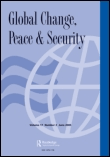
Global Change Peace & Security
Innovating Solutions for Global Security and CooperationGlobal Change Peace & Security is a prominent scholarly journal published by Routledge Journals, Taylor & Francis Ltd, focusing on the intricate interplay between global change and peace efforts within the realms of political science and international relations. With an ISSN of 1478-1158 and an E-ISSN of 1478-1166, this esteemed journal spans from 2008 to 2024, consistently contributing to critical discourse in its field. Ranked in the second quartile (Q2) for both Political Science and International Relations as well as Sociology, it occupies a distinguished position with a Scopus ranking of 134 out of 706 and a percentile standing of 81st in Political Science. The journal’s objective is to bridge the gap between theoretical frameworks and functional policy discussions, thereby fostering dialogue that addresses contemporary challenges in global governance and human security. By offering rich, research-based insights and analysis, Global Change Peace & Security serves as a vital resource for academics, practitioners, and policy-makers committed to advancing peace and security amidst pervasive global transformations.
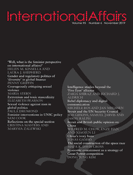
INTERNATIONAL AFFAIRS
Advancing Understanding in International RelationsINTERNATIONAL AFFAIRS, published by OXFORD UNIVERSITY PRESS, stands as a premier journal in the fields of political science and international relations, boasting an impressive Impact Factor and a reputation for rigorous scholarship. Established in the United Kingdom, the journal's ISSN is 0020-5850 and its E-ISSN is 1468-2346. From its inception to the present, it has played a crucial role in analyzing and interpreting global issues that shape our world, with a notable mention of its Q1 quartile ranking in both Political Science and Sociology according to 2023 metrics. Researchers and practitioners alike benefit from its high-quality, peer-reviewed articles, which consistently rank it in the top percentile of its category, underscoring its significance in contemporary discourse. As the journal continues to evolve, it remains a vital resource for those looking to deepen their understanding of international affairs and sociopolitical dynamics.

Revista de Estudios en Seguridad Internacional-RESI
Advancing Knowledge in International Security StudiesRevista de Estudios en Seguridad Internacional (RESI) is a distinguished academic journal dedicated to the exploration and analysis of international security issues. Published by the University of Granada's Faculty of Political Science and Sociology, this journal has been on the forefront of critical security studies since its Open Access inception in 2015, providing a platform for researchers, practitioners, and students to share innovative ideas and scholarly work. With a focus on contemporary themes in international security, RESI encourages interdisciplinary dialogue and engagement, fostering a deeper understanding of global challenges. As a vital resource for those involved in political science and security studies, the journal aims to disseminate rigorous research that contributes to both academic scholarship and practical applications in policy-making. Researchers and professionals alike will find RESI an invaluable space for advancing their inquiries and sharing their findings with a global audience.
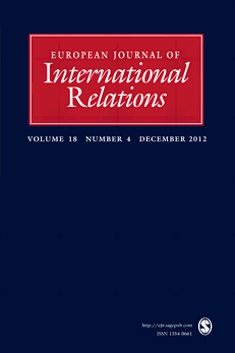
EUROPEAN JOURNAL OF INTERNATIONAL RELATIONS
Illuminating the pathways of global interconnections.The EUROPEAN JOURNAL OF INTERNATIONAL RELATIONS (ISSN: 1354-0661, E-ISSN: 1460-3713), published by SAGE Publications Ltd, stands as a prestigious conduit for innovative scholarship in the fields of Political Science and International Relations. Launched in 1995, this esteemed journal has carved a significant niche within the academic community, achieving a remarkable Q1 ranking for both Political Science and Sociology in 2023, along with an impressive Scopus rank, placing it within the top 5% of its category. This journal is committed to advancing rigorous analysis and fostering critical discourse on global interrelations, offering researchers, professionals, and students a platform for high-quality empirical and theoretical studies. Although it does not provide open access, the journal’s curated selection of articles, reviews, and original research continues to make it a vital resource for understanding the complexities of international relations in a contemporary context. As it converges through the years up to 2024, EUROPEAN JOURNAL OF INTERNATIONAL RELATIONS remains an essential reference for those striving to contribute to or engage with critical knowledge in the evolving landscape of global politics.
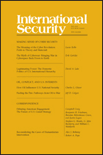
INTERNATIONAL SECURITY
Exploring the critical intersections of policy and safety.INTERNATIONAL SECURITY is a premier academic journal published by MIT PRESS, dedicated to advancing scholarly discourse in the fields of Law, Political Science, and International Relations. With an ISSN of 0162-2889 and an E-ISSN of 1531-4804, this highly regarded publication has established itself as a critical resource for researchers, professionals, and students since its inception in 1984. Renowned for its rigorous peer-review process and impactful articles, INTERNATIONAL SECURITY consistently ranks within the top quartile across multiple disciplines, achieving a remarkable Q1 classification in the latest 2023 metrics. Notably, it holds impressive positions in Scopus Ranks, including Rank #24 in Law and Rank #25 in Political Science and International Relations, reflecting its significant contribution to the field. Unfortunately, the journal does not currently offer open access options, but its comprehensive analyses of global security issues make it an invaluable tool for those seeking to deepen their understanding of contemporary challenges in the international arena. Whether you are a seasoned researcher or an emerging scholar, INTERNATIONAL SECURITY serves as a vital platform for exploring the intersections of security, policy, and global affairs.
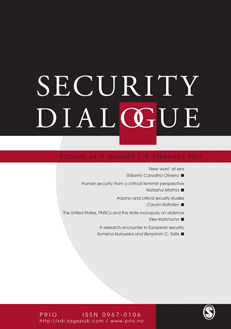
SECURITY DIALOGUE
Illuminating Pathways in International Relations and BeyondSECURITY DIALOGUE is a premier academic journal published by SAGE PUBLICATIONS LTD, renowned for its rigorous approach to the critical fields of Political Science and International Relations as well as Sociology. Since its inception in 1970, the journal has established itself as a leading platform for scholarly discussion, achieving a prestigious Q1 ranking in both categories as of 2023, with impressive Scopus rankings placing it in the 94th percentile for Political Science and International Relations and the 91st percentile for Sociology. Although currently not an Open Access journal, SECURITY DIALOGUE fosters a wealth of innovative research and insights, making it essential for researchers, practitioners, and students committed to understanding the multifaceted dynamics of security and societal challenges in a rapidly changing global landscape. The journal's commitment to quality and impact is evident in its extensive citation metrics and enduring relevance, making it a cornerstone in the study of security dialogues in contemporary societies.